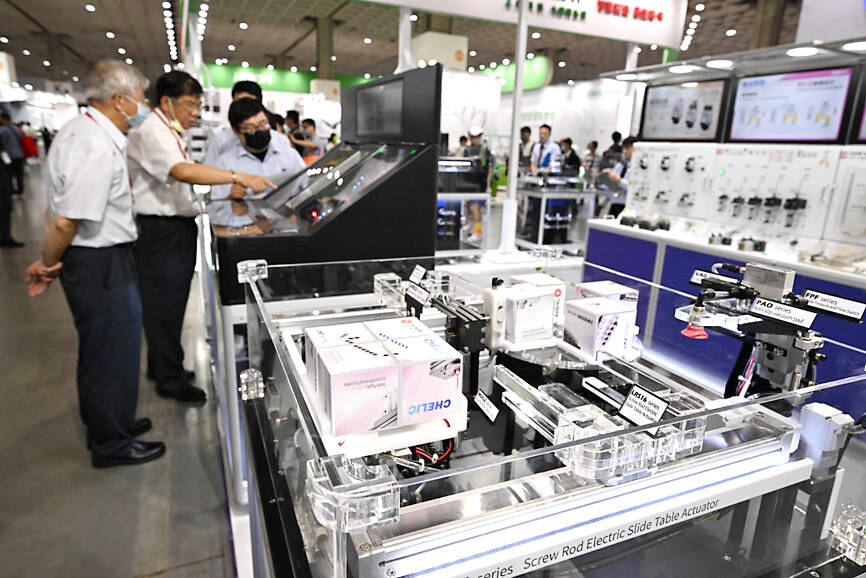The manufacturing industry’s business climate monitor in October flashed “yellow-blue” for a fourth consecutive month, indicating sluggishness, as the operating environment and demand picked up, but selling prices and input budget dropped further, the Taiwan Institute of Economic Research (TIER, 台灣經濟研究院) said yesterday.
The composite index compiled by the Taipei-based think tank gained 0.76 points to 11.59, indicating listless manufacturing activity, as inventory adjustments lingered due to weak end-market demand.
TIER uses five levels to capture the industry’s cyclical movements, with “red” indicating a boom, “green” suggesting steady growth and “blue” signifying a downturn.

Photo: Tien Yu-hua, Taipei Times
Yellow-blue indicates a tepid state and yellow-red a pickup in growth momentum.
Manufacturers that reported a decline in business eased from 40.87 percent in September to 30.36 percent in October, while firms that experienced a slowdown dropped from 50.22 percent to 41.92 percent, the monthly survey found.
Companies whose business remained steady increased from 7.87 percent to 26.79 percent, while firms that reported an increase slid from 1.04 percent to 0.93 percent, it said, adding that none saw a boom.
Electronics companies said that business was steady, as robust demand for artificial intelligence (AI) and cloud services lifted the suppliers of servers and graphic cards by double-digit percentage points, TIER said.
That helped offset continued inventory corrections at chipmakers and optical device vendors, it said.
The AI bonus underpinned the uptick in subindices of operating conditions, demand and costs, while sticky global inflation and restrictive monetary policies continued to weigh on other subindices, such as selling prices and input spending, the institute said.
Suppliers of transportation tools and auto parts also said that business was steady, backed by healthy auto sales in Taiwan, it said.
Furthermore, a growing number of Taiwanese firms are taking part in the global supply chains of electric vehicles (EVs) and benefited from increasing EV demand in China and the US, TIER said.
Textile and paper product makers remained mired in a recession, as a global slowdown curtailed demand and rivals from China cut prices to win customers, the institute said.
The Israel-Hamas war boosted international oil prices and benefitted local petrochemical product makers, lifting their business climate gauge from blue to yellow-blue.
Base metal suppliers floundered due to soft restocking demand from downstream customers, stopping them from buying input materials, the institute said.
Metal product vendors fared better, thanks to demand from consumer electronics gadgets ahead of the holiday season, it said.

GROWING OWINGS: While Luxembourg and China swapped the top three spots, the US continued to be the largest exposure for Taiwan for the 41st consecutive quarter The US remained the largest debtor nation to Taiwan’s banking sector for the 41st consecutive quarter at the end of September, after local banks’ exposure to the US market rose more than 2 percent from three months earlier, the central bank said. Exposure to the US increased to US$198.896 billion, up US$4.026 billion, or 2.07 percent, from US$194.87 billion in the previous quarter, data released by the central bank showed on Friday. Of the increase, about US$1.4 billion came from banks’ investments in securitized products and interbank loans in the US, while another US$2.6 billion stemmed from trust assets, including mutual funds,

Micron Memory Taiwan Co (台灣美光), a subsidiary of US memorychip maker Micron Technology Inc, has been granted a NT$4.7 billion (US$149.5 million) subsidy under the Ministry of Economic Affairs A+ Corporate Innovation and R&D Enhancement program, the ministry said yesterday. The US memorychip maker’s program aims to back the development of high-performance and high-bandwidth memory chips with a total budget of NT$11.75 billion, the ministry said. Aside from the government funding, Micron is to inject the remaining investment of NT$7.06 billion as the company applied to participate the government’s Global Innovation Partnership Program to deepen technology cooperation, a ministry official told the

AI TALENT: No financial details were released about the deal, in which top Groq executives, including its CEO, would join Nvidia to help advance the technology Nvidia Corp has agreed to a licensing deal with artificial intelligence (AI) start-up Groq, furthering its investments in companies connected to the AI boom and gaining the right to add a new type of technology to its products. The world’s largest publicly traded company has paid for the right to use Groq’s technology and is to integrate its chip design into future products. Some of the start-up’s executives are leaving to join Nvidia to help with that effort, the companies said. Groq would continue as an independent company with a new chief executive, it said on Wednesday in a post on its Web

Taiwan Semiconductor Manufacturing Co (TSMC, 台積電), the world’s leading advanced chipmaker, officially began volume production of its 2-nanometer chips in the fourth quarter of this year, according to a recent update on the company’s Web site. The low-key announcement confirms that TSMC, the go-to chipmaker for artificial intelligence (AI) hardware providers Nvidia Corp and iPhone maker Apple Inc, met its original roadmap for the next-generation technology. Production is currently centered at Fab 22 in Kaohsiung, utilizing the company’s first-generation nanosheet transistor technology. The new architecture achieves “full-node strides in performance and power consumption,” TSMC said. The company described the 2nm process as